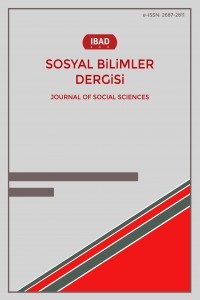Olasılık Kuramında Veni, Vidi, Vici
Olasılık kuramını önceleyen üç olmazsa olmaz koşul vardır. Bunlar bu çalışmada Gaius Julius Caesar’dan (İÖ 100-İÖ 44) ödünç alınan veni, vidi, vici sözcükleriyle dile getirilmektedir. Veni, rastgelelik düşüncesindeki değişimi simgeler. Yeni düşünceye göre rastgelelik artık Tanrısal istemi öğrenmek için bir im değildir. O, sonuçların öngörülemezliği ile ilgili bir özelliktir. Söz konusu düşünce Chevalier de Méré gibi kumarseverlerde de, Blaise Pascal gibi matematikçilerde de ortaktır. Vidi, rastgele sonuçlarla ilgili alacakaranlıkların günışığına yakınlıklarını ölçme güdüsü olarak betimlenebilir. Bu, ilk olarak Tuscany’nin Büyük Beyi ya da Chevalier de Méré gibi kumarseverlerde gözlemlenen bir özelliktir. Vici ise bu güdüyü doygunluğa ulaştırabilme yeteneği olarak betimlenebilir. Söz konusu yetenek ilk olarak Galileo Galilei, Blaise Pascal ve Pierre de Fermat gibi matematikçilerde gözlemlenen bir özelliktir. Bu matematikçiler eş-olabilirlik kavramından yararlanarak rastgele sonuçlara ilişkin alacakaranlıkların günışığına yakınlıklarını nicelleştirmeyi başarırlar.
Anahtar Kelimeler:
Olasılık Kuramı, Rastgelelik, Kumar
Veni, Vidi, Vici in Probability Theory
Three driving forces which are the precursors of probability theory have been represented in this study by the words veni, vidi, vici, borrowed from Gaius Julius Caesar. The first driving force is the new thought of randomness. Randomness that was interpreted as the manifestation of the God’s desire from then on meant nothing less than unpredictability of physical processes. The second driving force, represented by the word vidi, is the awareness of gamblers about that unpredictability is able to quantify. The gamblers tend to the mathematicians by their awareness and desire from them to quantify unpredictability. The accomplishments of mathematicians on this topic are the product of the third driving force represented by the word vici. The mentioned driving force is related to the awareness of equipossibility. An evolution from astragalus to dice creates an appropriate historical ground in order to obtain that concept. Probability theory begins when the last driving force is added to the previous ones.
Keywords:
Probability Theory, Gamble Randomness, Unpredictability, Equipossibility,
___
- David, F. N. (1955). Dicing and Gaming (A Note on the History of Probability). Biometrika, 42, 1-15.
- Galavotti, M. C. (2005). Philosophical Introduction of Probability. CSLI Publications: Stanford/California.
- Gillies, D. (2000). Philosophical Theories of Probability. Routledge: London and New York.
- Hacking, I. (1991). The Emergence of Probability. Cambridge University Press: Cambridge.
- Kendall, M. (1970a). The Beginnings of a Probability Calculus. Studies in the History of Statistics and Probability II (Editor E. S. Pearson-M. G. Kendall), Hafner Publishing Company: London, 19-34.
- Kendall, M. (1970b). Where Shall the History of Statistics Begin? Studies in the History of Statistics and Probability II (Editor E. S. Pearson-M. G. Kendall), Hafner Publishing Company: London, 45-46.
- Korkmaz, A. (2005). Olasılık Kuramının Doğuşu. Ankara Üniversitesi SBF Dergisi, 60 (2), 171-193.
- Korkmaz, A ve Avar, A. (2019). Olasılık: Janus Yüzlülüğün Eski ve Yeni Görünümleri. Uluslararası BilimselAraştırmalar Dergisi (IBAD), 4 (1), 81-92..Kunoff, S. ve Pines, S. (1986). Teaching Elementary Probability through Its History. The College Mathematics Journal, 17 (3), 210-219.
- Locke, J. (1999). An Essay Concerning Human Understanding. The Pennsylvania State University: USA.
- Ore, O. (1960). Pascal and the Invention of Probability Theory. American Mathematical Montly, 67 (5), 409-419.
- Östenberg, I. (2013). Veni Vidi Vici and Caesar's Triumph. The Classical Quarterly, 63 (2), 813-827.
- Pascal, B. (1972). Penseés. Penguin Books: London.
- Pascal, B. (2000). Düşünceler. Kaknüs Yayınları: İstanbul.
- Sambursky, S. (1956). On the Possible and Probable in Ancient Greece, Osiris, 12, 35-48.
- Sarton, G. (1946). The Life of Science (Essays in the History of Civilization). Henry Schuman: New York.
- Todhunter, I. (1865). A History of the Mathematical Theory of Probability (From the Time of Pascal to That of Laplace). Macmillan and Co. : Cambridge and London.
- Yayın Aralığı: Yılda 2 Sayı
- Başlangıç: 2016
- Yayıncı: Hayrullah KAHYA
Sayıdaki Diğer Makaleler
Ebeveyn ve Akran İlişkilerinin Genç Kızlarda Madde Kullanımına Etkisi
KOBİ’lerde Sanayi 4.0’ın Uygulanabilirliği ve Yönetici Bakış Açılarının Değerlendirilmesi
Öğretmen Eğitimi Programlarını Değerlendirme Ölçeğinin Geçerlik ve Güvenirlik Çalışması (ÖEPDÖ)
Kıl Dokuma ile Kültürel Mirası Geleceğe Aktarmak Üzerine Deneysel Bir Çalışma
Salih ŞAHİN, Okan ERTOĞRAL, Muhammet Ali YARICI
Zehra ÇAKIR, Sema ALTIN YALÇIN, Paşa YALÇIN
